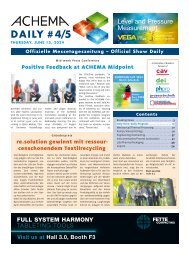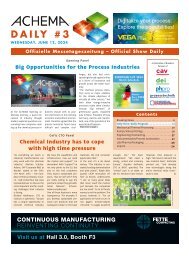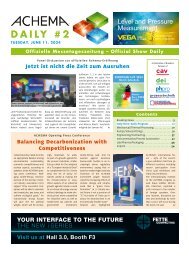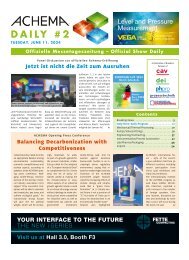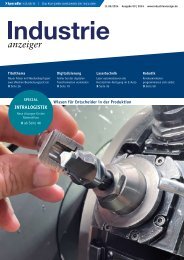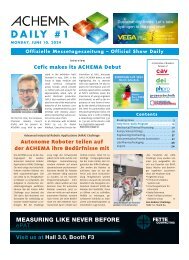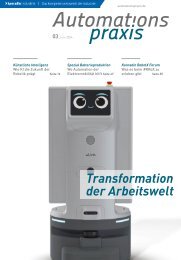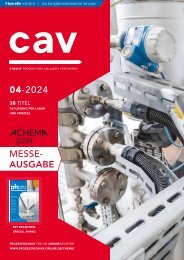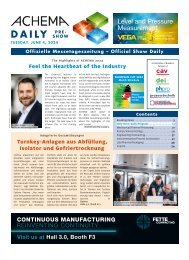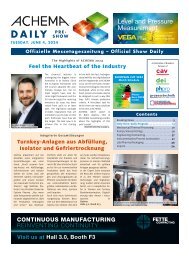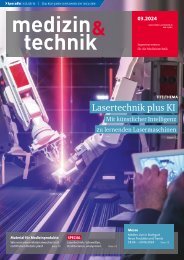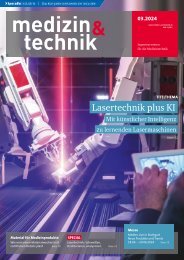EPP Europe P2.2023
You also want an ePaper? Increase the reach of your titles
YUMPU automatically turns print PDFs into web optimized ePapers that Google loves.
the cost of capital; 88 percent show that<br />
good ESG practices lead to better operational<br />
performance, and 80 percent<br />
show that share price performance is<br />
positively correlated with good sustainability<br />
practices. The development of sustainable<br />
alternatives in products and operational<br />
processes is a driver of innovation.<br />
How exactly does ASMPT<br />
approach ESG, SDG and net-zero?<br />
Our vision proclaims: “Shaping a bright &<br />
sustainable future for customers, employees,<br />
investors, partners and society”.<br />
All employees must be able to develop<br />
awareness of ESG and sustainability issues<br />
in general, and of ASMPT’s focused<br />
activities in particular. To achieve this, we<br />
have established a central and crossfunctional<br />
Environmental, Social & Governance<br />
(ESG) Team. This global team focuses<br />
on achieving our ambitious netzero<br />
targets across all ASMPT segments.<br />
It has also defined and communicated our<br />
net-zero targets for Scopes 1 and 2. To<br />
this end, we have identified the most effective<br />
emission-reducing levers and<br />
measures, prioritized, and selected suitable<br />
and proven practices for CO 2<br />
avoidance,<br />
and provided the necessary financial<br />
resources. With a focus on our targets,<br />
these measures are reviewed and reported<br />
on every two months at each<br />
ASMPT site.<br />
What kinds of measures would those be?<br />
Measures to reduce emissions include, for<br />
example, reducing the energy demand at<br />
each of our sites by investing in new systems.<br />
Others include generating electricity<br />
from renewable sources in-house, and<br />
the electrification of vehicles. All this is<br />
supported by OpEx measures, such as the<br />
procurement of electricity from renewable<br />
energy sources and the purchase of<br />
green electricity and CO 2<br />
compensation<br />
certificates. When discussing such<br />
measures, we must consider each location<br />
separately. We cannot generate<br />
our own energy at will at all our locations,<br />
and not all our sites have providers<br />
who supply electricity from renewable<br />
sources.<br />
Can you give us a few examples of<br />
measures that have already been taken?<br />
Let me mention a few. Since 2019, we<br />
have achieved some initial success with<br />
our ESG measures and reduced CO 2<br />
emissions by 30 percent at our sites in<br />
Munich, Weymouth and Singapore. A few<br />
months ago we completed the installation<br />
of more than 1,200 solar panels at<br />
our global headquarters in Singapore.<br />
Solar panels are also already in use in<br />
Weymouth, UK, and in Huizhou, China.<br />
You mentioned that your Net Zero 2035<br />
program applies to Scope 1 and Scope 2<br />
of the Greenhouse Gas Protocol. What<br />
are your plans for Scope 3?<br />
Scope 3 refers to indirect emissions resulting<br />
from activities along the supply<br />
chain. This includes pollutant emissions<br />
which result from purchased goods and<br />
services, the use of products by customers,<br />
and the transportation of goods to<br />
customers – all highly complex issues.<br />
ASMPT has started to define the basics of<br />
Scope 3 emissions, such as those from the<br />
use of our products, whose energy efficiency<br />
is an issue that has long been close<br />
to our hearts. We are in the process of<br />
measuring Scope 3 emissions so that we<br />
will be able to set Scope 3 targets and reduction<br />
pathways. But reducing Scope 3<br />
emissions is not possible without cooperation<br />
across the industry. This is one of<br />
the reasons we launched the Semiconductor<br />
Climate Consortium (SCC) in<br />
November 2022 as a Leadership Level<br />
founding member. The SCC is the first<br />
global consortium of semiconductor companies<br />
that focuses on reducing greenhouse<br />
gas emissions. We hope that the<br />
consortium will empower each member<br />
to make an impact that goes far beyond<br />
its individual capabilities to combat climate<br />
change.<br />
Finally, what advice would you give to<br />
colleagues in the industry who are still<br />
in the very early stages of ESG?<br />
In a few words: do not be deterred by<br />
tasks that may seem complex at first.<br />
Educate yourself and identify possible<br />
starting points for your company. Just get<br />
started and take it one step at a time.<br />
Even if some measures seem like a drop in<br />
the ocean, we know many drops add up<br />
to the ocean.<br />
Mr. Lauber, we thank you for this interview.<br />
Productronica, Booth A3.377<br />
www.asmpt.com<br />
Source: UN<br />
<strong>EPP</strong> <strong>Europe</strong> » 11 | 2023 9



